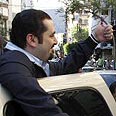
Hizbullah defeated in Lebanon vote
Final election results released by the Lebanese government show Saad Hariri's pro-Western bloc won 71 seats of 128-member legislature. Hizbullah warns of crisis if attempts are made to disarm Shiite organization. In response to results Israel's President Peres says 'Hizbullah remains a state within a state, prevents Lebanon's economic recovery'
A surprise election victory by an anti-Syrian coalition in Lebanon against the Iranian-backed Hizbullah and its allies was officially confirmed on Monday.
Results declared by Interior Minister Ziad Baroud showed Saad Hariri's pro-Western bloc had won 71 of parliament's 128 seats, against 57 for an opposition alliance that groups Shiite factions Hizbullah and Amal with Christian leader Michel Aoun.
Hariri's total includes three independents who ran on his lists in Sunday's election, which many had predicted would produce a slim victory for Hizbullah and its partners.
Supporters celebrated into the early hours. The result renewed Hariri's mandate four years after an election that followed the exit of Syrian troops from Lebanon amid an outcry over the assassination of his statesman father Rafik Hariri.
The vote was a blow to Syria and Iran, which support Hizbullah, and welcome news for the United States, Saudi Arabia and Egypt, which back the "March 14" bloc, named after the date of a huge rally against Syria's military presence in 2005.
Hizbullah warned of a crisis if attempts are made to disarm the Shiite organization.
Mohamed Raad, head of the Hizbullah faction in the Lebanese parliament, told the French news agency that the anti-Syrian camp's win "would lead to a continuation of political crisis with our camp, unless that camp sticks to the principle that Hizbullah's arms should not be touched.
"The results show that the crisis continues, unless the current majority seeks to change its behavior," he added.
The United States had no immediate comment, but France, another backer of the bloc, praised the "smooth functioning" of the election, which went off in mostly peaceful style.
"This vote, marked by a high level of participation, illustrates the vitality of Lebanese democracy," the French Foreign Ministry said. It expressed confidence that President Michel Suleiman would ensure swift formation of a new government that "takes the country on the path of reforms".
Israeli President Shimon Peres also commented on the election results, saying, "The results do not change the fact that Hizbullah remains a state within a state, an army within an army, and prevents Lebanon's economic recovery."
Earlier Monday, the Israeli Foreign Ministry issued a statement in response to the victory of the anti-Syrian block in Lebanese elections saying, "Any government to be formed in Beirut must make sure that Lebanon is not used as a base for violence against Israel and Israelis.
Defense Minister Ehud Barak said during a Labor faction meeting, "The victory of the moderate coalition is certainly a positive sign. But the true test of the government to emerge will be in its results and ability mainly to enforce order and curb Hizbullah activity in south Lebanon. Israel continues to follow the developments there and will examine its attitude towards the new Lebanese government according to these results."
"The Lebanese government must act boost stability and security in its territory, put an end to weapon smuggling and implement the UN Security Council's resolutions, starting with resolutions 1559 and 1701. Israel views Lebanon as responsible for all military and other activity that comes from its territory."
Total acceptance
Hizbullah and Amal swept the vote in mainly Shiite areas, but defeat for Aoun in the key Christian districts of Zahleh and Ashrafiyeh deprived the alliance of the majority it had sought.
Hariri, a Sunni Muslim, emerged as front-runner to lead the next government, following in the steps of his slain father, who as prime minister oversaw Lebanon's post-civil war rebuilding.
Amal leader and Parliament Speaker Nabih Berri said he fully accepted the results and congratulated the winners. "Lebanon has defeated all bets on chaos and strife and again gained its existence and reputation as a democratic country," he said.
Lebanon's rival camps are at odds over Hizbullah's guerrilla force, more powerful than the Lebanese army, and relations with Syria, which dominated Lebanon for three decades until 2005.
The likeliest outcome of the poll is another "national unity" government, analysts say, though its formation might not go smoothly if the Hizbullah camp again insists on veto power.
The United States, which lists Hizbullah as a terrorist group, has linked future aid to Lebanon to the shape and policies of the next government. Hizbullah, which says it must keep its arms to deter Israel, is part of the outgoing cabinet.
The March 14 coalition won the 2005 election in alliance with Hizbullah and Amal, but soon fell out with them, leading to a prolonged and sometimes violent conflict.
The opposition insisted on being given veto power in a unity cabinet - a demand that caused an 18-month political deadlock until it was granted under a Qatari-brokered deal that followed street fighting in Beirut in May 2008.
Tensions in Lebanon mostly have been kept in check since the Qatari-mediated accord dragged the country back from the brink of civil war. A thaw in relations between Saudi Arabia and Syria has also helped maintain stability in recent months.
Roee Nahmias and Roni Sofer contributed to this report















